Kolendo Jerzy
Professor Jerzy Władysław Kolendo was born on 9 June 1933 in Brześć nad Bugiem. In 1936 he moved to Białystok where he attended schools and completed his school finishing examinations. His family were good Polish patriots. His paternal grandfather had fought in the 1863 January Uprising and was exiled to Siberia. Both his parents were teachers – when Poland regained independence in 1918 his father, Władysław, helped institute Polish schools (second-level gymnasium) in Pińsk and Brześć and held the position of head teacher. His mother, Maria, a teacher of history and the Polish language, helped run the underground education in Białystok during World War II risking deportation and death. Orphaned by his father as a small boy Jerzy Kolendo was brought up by his mother. She introduced him to historical novels at an early age and instilled in him a love of history and his country. In Białystok, which up to 1945 used to be a town of many religions and nationalities, the Polish community was especially dedicated to keeping alive the traditions of Poland’s freedom and independence. When at the end of the war his mother was deported to a remote area of the Soviet Union Jerzy was taken care of by his aunt. The Professor regarded his mother as an outstanding educator.
Like most residents of Białystok of the day wishing to make an academic career Jerzy Kolendo chose to study at the University of Warsaw (UW). Obliged to live in one of its student dormitories he made some mostly unhappy memories of the communal life there and, being of a frail constitution, was often ill for longer periods of time. He did not like to reminisce to us about his time at the university, a period of mounting Stalinist oppression, with Bolesław Bierut in position as President and Chairman, years of mass arrests, trials and executions of Polish wartime military leaders who had fought against the Nazi and the Soviet invaders, and persecution of the heroes of the 1944 Warsaw Uprising. The Polish Komsomol (ZMP), youth organization subordinate to the Polish United Worker’s Party, ruled the roost, reporting on one’s peers to the secret services and drunkenness was rife; with the so-called “workers’ training” a part of the curriculum university students had to work for a time on a state farm, or in a factory, to “bond with the worker and the peasant class”. Unlike some of his peers, who were able to recall this element of their university education as an adventure, for Jerzy Kolendo, sickly and unaccustomed to physical labour, this must have been a true ordeal; similarly as attending the many obligatory courses in [Marxist-Leninist] ideology.
All the same, most of the professors had been educated before World War II, many of them were outstanding classical scholars, intellectuals and savants – the new regime had not yet trained its cadre of researchers and educators. In this respect the History Institute of the University of Warsaw was an exceptional enclave even in the world of academia of People’s Poland.
As the Professor himself recollected, originally he had wanted to study archaeology but expecting to fail drawing, an obligatory part of the entrance exams, he chose history instead. He attended courses taught by Aleksander Gieysztor, Tadeusz Manteuffel and Marian Małowist and joined the ancient history seminar of Iza Bieżuńska-Małowist under whose guidance he later wrote his MA and PhD dissertations. His lecturers were outstanding individuals from pre-war university teaching staff, of whom there was no lack in the UW History Institute of the time.
History in People’s Poland - similarly as most other courses in the humanities - was strongly influenced by ideology. The recommended research was in the “key issues of history”, such as class struggle, societal revolutions, economic matters - including the history of material culture – and in particular, the development of the tools of production. But at the History Institute UW, according to the relations of some of its staff members, these requirements were not enforced. Nevertheless, the title of Jerzy Kolendo’s MA dissertation (never published) was a model in compliance. Its subject were revolts in Gaul of the first century AD which in the official interpretation of Marxist science were treated as social upheaval. The contents of that same dissertation were less law-abiding however. During the work on his MA paper the Jerzy Kolendo became familiar with numerous themes which would remain within his field of interest: Romanisation, Gaul, Roman-Barbarian relations, the Roman army, Emperor Nero and last, but not least, Tacitus. His studies at the History Institute UW provided a sound grounding in the methodology of historical research, especially in hermeneutics, a good knowledge of Marxism and not always the best memories.
After graduation Jerzy Kolendo continued as staff member of the Institute of History of the Polish Academy of Sciences for fourteen years and went abroad for the first time, to France and Italy. The intellectual elites of Western Europe of the time had strong leftist leanings and were fascinated by socialism, Marxism, studies in material culture and social and economic themes pursued in the Soviet bloc. This favoured intensive research exchange, Polish-French in particular, with the Annales School, named after its scholarly journal Annales. Économies, Sociétés, Civilisations. In case of Poland a major contribution to the development of this exchange was made by two outstanding scholars - Professors Aleksander Gieysztor and Witold Kula, and also, by the pioneer research of Polish medievalists on abandoned medieval villages. In the group of researchers who were invited to Paris were also some young historians, e.g., Bronisław Geremek, on the same grant as Jerzy Kolendo, and the two became friends. This contact with the school of Fernand Braudel left an intelligible intellectual mark on the young researcher which would be discernible in almost all of the Professor’s future scholarly output. Last but not least, for the first time he had access to the leading libraries of Europe and could complement his knowledge by attending lectures given by eminent French and Italian historians and epigraphers.
Jerzy Kolendo’s PhD thesis, defended at the University of Warsaw in 1960, a study of the colonate in Roman Africa, was the result of his studies at the Polish Academy of Sciences. Its subject was once again a “key issue of history” - agriculture in Africa, Rome’s principal granary. A translated, somewhat modified and supplemented, version of the PhD thesis went on to have two French editions: in 1976 and 1991. One could say that, thanks to the scientific doctrine then prevailing in Poland, the Jerzy Kolendo, like some other Polish historians, succeeded in being in tune with the economic issues then pursued by the intellectual elites of the Annales School; moreover, the studies in the colonate had a long tradition in France and were connected to the subject of the transition broadly speaking, from the slave society to feudalism. But obviously Jerzy Kolendo was noticed and recognized by French humanities scholars thanks to his hard, being exceptionally well-read and spectacular erudition.
Agrarian issues were also the subject of his habilitation work on technical advances and the workforce in the agriculture of ancient Italy earned at the University of Warsaw and published in 2980 in Rome in Italian. As the Professor liked to say, half jokingly, in these studies he had drawn on the experience gained during the “workers’ training” in the PGR State agricultural farms in the socialist countryside in Poland. There he observed that the simplest and quickest method of weed control in a beet plantation was to pull up weeds but also the young leaves of the crop vegetable. According to Jerzy Kolendo, Louis Robert, eminent French professor of epigraphy and polyhistor, claimed that the only two scholars who grasped the reasons for the unprofitability of the Roman latifundia were Kuzishchin in Moscow and Kolendo in Warsaw. As the Professor stressed, his habilitation had been approved in January 1968, meaning, before the proliferation of the so-called “March docents” who obtained their appointment without having written their habilitation thesis. This was in the aftermath of the events of the Polish March 1968 when many academics, no longer able to practice their profession, left Poland; moreover, the authorities wanted to have a squad of submissive academics, but this was a failed effort, at least as far as the University of Warsaw was concerned.
For Jerzy Kolendo this “renewal” of Polish scholarship meant that he had to leave the Institute of History Polish Academy of Sciences when the efforts to set up a research unit dedicated to Antiquity studies came to naught. Never a member of any political party Jerzy Kolendo found it hard to find employment. Fortunately, the Chair of Polish and General Archaeology headed by Professor Waldemar Chmielewski came to the rescue. At 10 Widok Street the Professor proved his calling as a teacher and his truly Great Adventure with archaeology began, one that he had dreamt of since childhood.
He stayed with the UW until the end and retired from the Institute of Archaeology in 2003 continuing to be associated with the Centre for Studies on Antiquity of South-Eastern Europe. At the University of Warsaw he had earned the titles of associate and full professor and celebrated the renewal of his doctorate in 2011. He lectured also in Paris at the Sorbonne (Paris I Pantheon), in Strasbourg and Padua.
During his early teaching days at the university he ran a seminar in tandem with Jerzy Okulicz with whom he shared many views, notably on the allochthonist origin of the Slavs meaning that they migrated to the territory of today’s Poland from that of today’s Ukraine only during the Migration Period. Next to Cracow Warsaw was the only centre in Poland where prehistorians were ready to admit, still in the period before World War II, that during the early centuries AD the region to the north of the Carpathian mountains was under Germanic settlement, or that Calisia known to Ptolemy cannot be identified with modern town of Kalisz. To espouse and promote similar views was to risk serious trouble in People’s Poland, such as the withholding of one’s professorship, something that happened to dr. hab. Jerzy Wielowiejski. Professor Kolendo published this part of his views in Poland, in a popular form, twenty years ago, in the issue of Archeologia Żywa companion to the First Archaeological Festival at Biskupin. The title of his brief contribution to this popular science archaeological magazine: “Proto-Slav Biskupin is an academic legend” caused an uproar among Polish archaeologists who were the proponents of the autochthonist view on Slavs. Today it would not have raised any emotion.
During his tenure as lecturer he was advisor for a few dozen MA and six PhD theses. Four of his PhD students went on to earn a professorship, the fifth recently has earned his habilitation degree. But even more significant was the school of multidisciplinary research he created which instilled in a succession of his pupils a great respect for the sources. A fitting motto for this school could be the: “do not be offended by the sources”. This saying of the Professor underpinned the whole methodology, philosophy and ethics of research, which used to and - at times - continues to be - in contradiction with views expounded by other researchers. His attitude to the sources was extremely principled, he held that even that the apparently most trivial must be analysed and published – their provenance, preservation, place of storage and ownership. This led him to regard as his duty as a scholar to analyse archaeological objects known from archival records and from early, sometimes vestigial, references, developing in this way the field of “library archaeology”, as well as those held by private collectors or recovered by amateur prospectors.
Almost everyone who had studied with Jerzy Kolendo has some fond memories or anecdotes from this association. After one of the Professor’s lectures Przemysław Wielowiejski, now PhD, and deputy director of the Copernicus Science Centre in Warsaw, sitting in the cramped vestibule at 10 Widok Street said that personally he would be happy to have knowledge limited to entries starting with just one letter, say, letter “A”, out of Professor Kolendo’s encyclopaedia of knowledge. Whenever anyone of us was stumped for answer on a given subject, from any field, we would say, jokingly, “Ask Professor Kolendo”. But what is most astounding, Jerzy Kolendo really had the answer to most of our questions.
When after a paramilitary training class (in my day during our fourth year) we were trying to get to the bottom of the mechanism of the AK-47 rifle the Professor approached us and, hearing our talk, delivered an ad hoc lecture on the evolution of the mechanism of gun locks, starting from the flintlock through to the modern inventions; while on that subject he noted that the outcome of the Crimean War had been settled by the mechanism of the French rifles. What a timeless remark that would prove to be! Today the outcome of a war in the same region also depends on the firearms of non-local production.
His learning and memory were truly impressive and even more so, his abilities of lecturer and tutor, even if acquired relatively late in life. He knew how to instil a work ethic in his students. We were all very familiar with those moments when, discussing the outline of our papers, the Professor could always spot, acknowledge and comment favourably on some element. After which, invariably, one heard the traditional “but”, and would feel as if someone pushed us deep into the chair and - at times – overcome by an irresistible urge to hide behind the curtain. We then would do our best to feel less ashamed during the next meeting.
His great teaching talent and interdisciplinarity of instruction went hand in hand with the many fields of interest of his research: contacts between the Barbaricum and the Mediterranean world, economic and social history of ancient Rome, Latin epigraphy, the history of interest in the Mediterranean world taken in Poland and in Europe, to name a few1
Some of these fields of study, such as Roman-Barbarian relations, especially the question of the Baltic amber, and Latin epigraphy, came at a later stage of his academic career when he started his cooperation with archaeologists which brought him into contact with Latin inscriptions on his early visits to the Polish dig in Bulgaria at the legion I Italica Roman camp Novae in Bulgaria. Soon he made acquaintance with the greats of epigraphy such as Professor Louis Robert, Hans-Georg Pflaum and Professor Antonio Sartori and befriended the latter; he soon made his name as a Latin epigrapher best known outside Poland, publishing e.g., the complete set of inscriptions from Novae, and, with J. Żelazowski, an excellent outline of Latin epigraphy. Each of the many fields and disciplines pursued by the Professor2 merits a similar mention but there is no room to do justice to them here.
Jerzy Kolendo was a scholar of European format, widely known and recognized worldwide. We won special high regard for his ability to combine three elements: 1. Extraordinary factual knowledge and erudition, 2. extensive hermeneutics, 3. synthetic approach and thinking in models.
Research was literally everything to the Professor. Naturally, there were many topics in which he took interest and was ready to talk about, but he was at his most animated when discussing academic subjects. When he put in appearance at a group event, at a seminar or conference, it was evident that he would take part in the discussion. When no one in the audience was ready to comment on a presentation - for instance - one dedicated to a more esoteric subject, everyone would turn their eyes to Professor Kolendo. When taking the floor he never revealed to the person giving the presentation or to the person taking part in the debate, his command of the facts, usually greatly superior to theirs. He tried to have them arrive at a specific idea themselves, realize the mistakes they had made or their erroneous reasoning. This was also his way during exams. In a more narrow circle of his students it could happen that during a more heated discussion he would utter some expletive, to lend more weight to a given argument he was expounding to us, his juniors; once, in a protest against having Ptolemy’s Calisia identified with Kalisz against a fellow researcher from the Polish Academy of Sciences he broke his spectacles. This was the Professor for you, flesh and blood, to those who knew him best …
Katarzyna, the Professor’s daughter, recollected that she had never seen her Father other than stooped over his books and desk, never mind what time she went to bed or got up. And there is an anecdote that when the lights burnt long into the night in the Palazzo Farnese, seat of the French Historical Institute in Rome, the Italians quipped: “Oho, Professor Kolendo is back”.
Space is too short here to enumerate all of the Professors academic achievements. He published more than 600 texts, including 16 monographs, most of them outside Poland3. But if we applied the Hirsch index to citations made in humanities, Professor Kolendo is certain to find himself close to the top in Poland. This is not the proper place to recall how Professor Kolendo referred to all the points and indexes used at present to position academics and to parameterize academic institutions. He had his own classification in which he divided scholarship into four classes: A, B, C and D, the latter with an additional meaning in Polish – something like “crappy” or ‘half-a…d’.
Professor Kolendo was a patriot. Despite various invitations to take up residence in the West he always declared that his permanent place of residence and work was Poland; the territory of Poland, finds made by Poles or by Polish antiquarians and scholars were the subject of most of his published works. This was one of the main reasons he was awarded the Commander’s Cross of Polonia Restituta in 2011 by President Bronisław Komorowski.
He was a person of extraordinary modesty, both in his profession and private life. This modesty greatly impressed all those who came to know him. One of them was Fernando Lopez Pardo (1955-2010), Spanish historian and archaeologist concerned with Roman Africa, who trained with Professor Kolendo in the 1980s, not the happiest of periods in our history. Upon his arrival the Spanish researcher was astounded by the number of works published by his Mentor and asked whether truly the author was one and the same, and if so, surely he must be almost hundred years old? And when after the Professor’s return from Padua he visited him at his home he found it hard to believe that the modest apartment was the place of residence of a scholar of such rank of whom he had heard so much from his mentor Professor J. M. Blazquez Martinez.
The Professor’s self-effacement is illustrated aptly by an occurrence at a conference held in Malbork more than thirty years ago dedicated to the Wielbark archaeological culture (then known by other names). The upper layer of a grave excavated in the prehistoric cemetery at Nowy Targ dated to the 1st century AD had yielded a small fragment of metal sheet with an inscription AV[?]. Professor Kolendo, who as part of his epigraphy studies also took interest in inscriptions from the category of instrumenta domestica discovered in Poland, proposed to interpret the said inscription as a fragment of the imperial title AV[G], admitting nevertheless that the shape of the letters did not agree with the chronology of the grave. During the discussion Romuald Odoj, an archaeologist from Olsztyn, identified the find as a fragment of a medieval Teutonic Knight’s buckle, with an inscription of AV[E MARIA], a commonly encountered late medieval (1300-1500) find in this region. Professor Kolendo went pale, admitted that Mr. Odoj was right, and next, this one of the greatest Polish polyhistors and erudites, apologized to those present for the misunderstanding the result - he said - of his ignorance and limited understanding, to which the audience reacted first, by great merriment and next rewarded him with a thunderous applause.
In his final years and months the Professor was for us a model of fortitude and determination. Despite his deteriorating health he went on working even when he found it very hard and painful to use his computer keyboard and finally had to dictate his text. This he did only to the select few who he trusted that they would understand. Until the end he received calls from his students ever ready with his assistance and advice.
Professor Jerzy Kolendo died on 28 February 2014.
He was a peerless model of a lecturer, scholar, erudite and humanist. He was also, or perhaps, the most importantly, a wonderful, dear, sensitive man, warm-hearted, well loved by his students.
His memory will live on as new every new generation of university students learn about his scholarly contribution, hear anecdotes about the Professor, discovering the secrets of the world of Antiquity – both Classical and Barbarian – so beloved of him.
He will be always hold a special place in our hearts and minds.
AB
Footnotes:
-
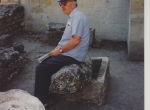 full resolution
full resolution
Photo 1.
-
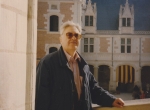 full resolution
full resolution
Photo 2.
-
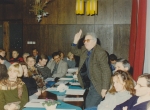 full resolution
full resolution
Photo 3.
-
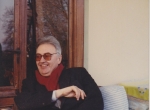 full resolution
full resolution
Photo 4.
-
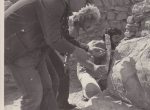 full resolution
full resolution
Photo 5.
-
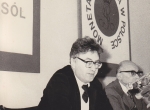 full resolution
full resolution
Photo 6.
-
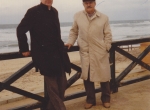 full resolution
full resolution
Photo 7.
-
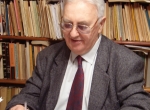 full resolution
full resolution
Photo 8.
-
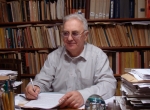 full resolution
full resolution
Photo 9.
-
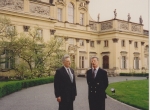 full resolution
full resolution
Photo 10.


